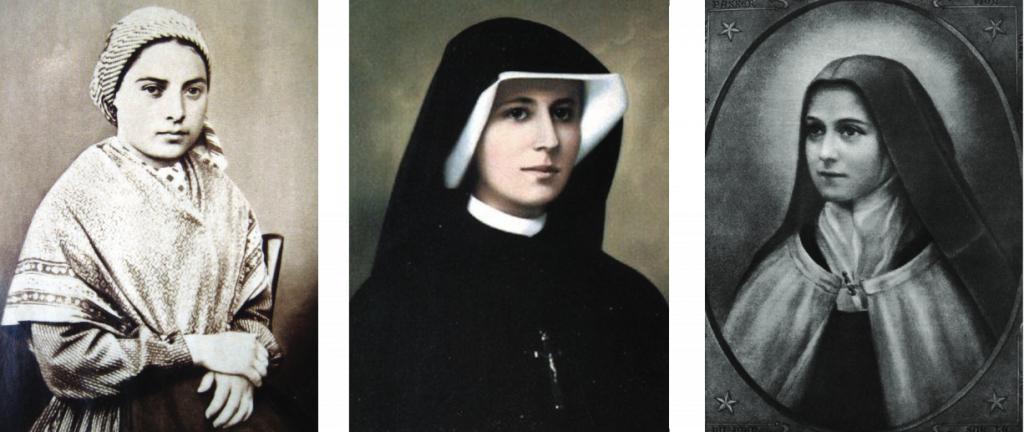“I believe that God has never intended us to walk this journey alone,” says Elizabeth Ficocelli, Catholic convert and author of “Thérèse, Faustina and Bernadette: Three Saints Who Challenged My Faith, Gave Me Hope, and Taught Me How to Love” (Ave Maria Press, $12). In her book, she recounts how these three remarkable women — her “powerhouses” — guided her path to God, and how they can guide us, too, in our own spiritual walks of life.
Kris McGregor: How did you see the thread that connected these three saints, Thérèse of Lisieux, Faustina Kowalska, and Bernadette Soubirous?
Elizabeth Ficocelli: I truly believe it was an inspiration. As I thought about these three women, what came to me very clearly were the virtues of faith, hope, and love. Saints are canonized because of their heroic virtue, and while these saints embody many virtues, I see a dominant virtue of each of them, with Bernadette being faith, Faustina being hope, and Thérèse being love.
They have had such an impact on my life as a wife, mother, and Catholic evangelist, and they can help us grow in these same virtues.
McGregor: Why are these women God’s “little ones”?
Ficocelli: These women were very much humble little ones, and that’s exactly what gave me the courage to tell my little story. We’re all little ones.
Some people ask me how these celibate women, cloistered religious, helped me as a wife and mother. But it was that virtue of living simple, obedient, faithful lives. They overcame their self-doubts and their own wills to say yes to God in the tasks he had for each one of them. And in saying yes, and accepting themselves for who they were, God worked extraordinary things through all of them.
That’s the great promise we have as Catholic disciples. All we have to do is join our faithful yes to God, and the possibilities are endless.
McGregor: How did Thérèse enter your life?
Ficocelli: I didn’t convert until I was 23. But I found a religious medal on the sidewalk one day, and I thought it was the Virgin Mary. I didn’t know other people could be on a medal. It would be 15 years before I discovered that this woman was Thérèse.
In my first years of Catholicism, when I was reading everything I could get my hands on, I came upon the inscription on the back of that medal: “After my death, I’ll let fall a shower of roses.”
Thérèse was this little French saint, gently leading me to the Catholic Church. She was the first subject of my first magazine article and my first adult book; she is at the heart of the mission I believe God gave me.
The virtue I ascribe to Thérèse is love. She was raised in a loving home, and her parents and siblings were all loving and nurturing, so her concept of God was loving, too. Why wouldn’t God be a loving father, if she was completely nurtured on love herself from her earthly family?
In “Story of a Soul,” Thérèse writes that she loved everybody in her community, even the ones that are difficult to love. She really challenged me to love the people in my path. Love is a daily decision, and that’s what we are called to do.
McGregor: What lessons can we learn from Faustina?
Ficocelli: Faustina opened my eyes to the divine mercy of God, and the chance to start again. At the time, I had a 4-year-old and a newborn. This baby never slept, and if you’ve ever gone through a string of sleepless nights, you can become unglued.
One morning, I lost all control with my 4-year-old for whatever he did that morning. And I realized how terrible that was, and I had to make this better with God.
I was still a relatively new Catholic, and confession was my stumbling block. I never got this important sacrament. But Faustina used this particular moment in my life to show me what forgiveness is all about.
As I was leaving the confessional, I felt like a bucket of warm water splashed down over me, and I was floating. I remembered what Faustina had been saying in her diary, how Jesus had told her, I want to pour out my ocean of mercy upon my sinners. That’s what divine mercy is all about.
McGregor: What about Bernadette’s model of obedience?
Ficocelli: Bernadette is an example to all of us, to challenge us in our faith. She held on, with deep conviction, that everything she saw and received in that grotto was genuine. She stuck to her testimony, never changing or embellishing it, just a simple, direct, consistent replay of Mary’s message.
Despite being interrogated by the police — she’s 14, she’s a child — she knows she’s committed to Our Lady. She stands up to the priest, who’s not receptive in the beginning at all.
In so many ways, she shows us what it means to be faithful. I think, how many times am I tempted not to remain faithful in a culture that’s not friendly to my personal morals and beliefs?
Bernadette throws this challenge at us, adults and young people alike. It comes back to our simple yes. Yes, I will overcome my self-will, I will overcome my flaws, I will live a life to attain heaven at the end.

